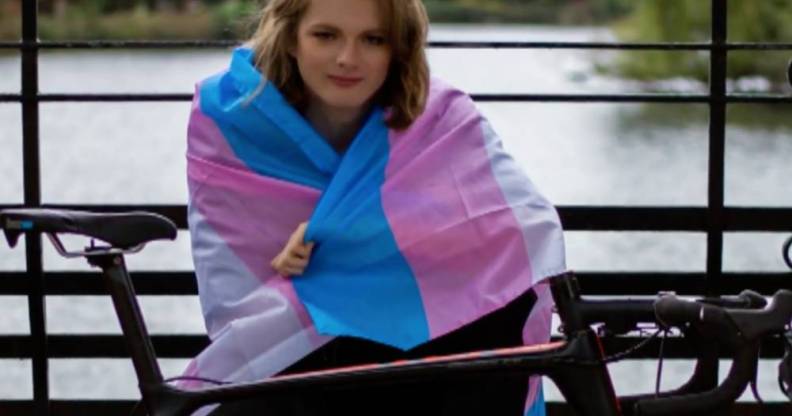Cyclist Emily Bridges says trans women are the ‘punching bags’ in a relentless ‘culture war’

Emily Bridges. (ITV News)
Cyclist Emily Bridges has called on LGBTQ+ allies to speak out and use their voice as trans women continue to be the “punching bag” of society.
It comes after she was blocked from participating in the women’s British National Omnium Championships in March after the world governing body of cycling, he Union Cycliste Internationale (UCI), ruled her ineligible.
Bridges came out publicly as trans in October 2020 and raced against men in 2021 as British Cycling’s policy stipulated that trans women must meet a certain testosterone level for at least 12 months before they can compete in the female race category. It means Bridges was only able to compete in a women’s event for the first time this year.
But days before the British National Omnium Championships, which would have seen Bridges race against some of the top names in the sport, the UCI said that she could not compete “under their current guidelines”.
In an interview with DIVA magazine, Emily Bridges has insisted she “does not have an advantage” over her competitors, several of which are said to have opposed British Cycling’s trans-inclusive policy.
“We’re the current punching bag populist movements like to go for,” she said. “We are, at the moment, who the culture war is against.
“There needs to be more positive voices and more education. People are constructing opinions off not the whole story.”
The UCI blocked Bridge’s participation in the elite-level race after more than 650 people signed a letter opposing the testosterone guidelines, including cyclists past and present.
One former cyclist, Maria Blower-Porter, told the Telegraph that the letter’s signatories felt like “we can speak on behalf” of the cyclists Bridges was set to race against.
Emily Bridges competed in men’s races while undergoing hormone therapy, finishing third to last at the the Loughborough Cycling Festival in May 2021 and second to last in the Welsh National Championship in September 2021.
“I could have just not ridden [in men’s events], which would probably have been somewhat better for my mental health and for affirming my identity,” Bridges said. “I don’t know if it’s the right decision or not, but that’s what I did.”
The International Olympic Committee’s guidance states that there should be no assumption that a trans athlete automatically has an unfair advantage in female sporting events, placing the responsibility on individual federations to determine eligibility criteria in their sport.
“I understand how you’d come to this conclusion because a lot of people still view trans women as men with male anatomies and physiologies, but hormone replacement therapy has such a massive effect. The aerobic performance difference is gone after about four months,” Emily Bridges explained.

